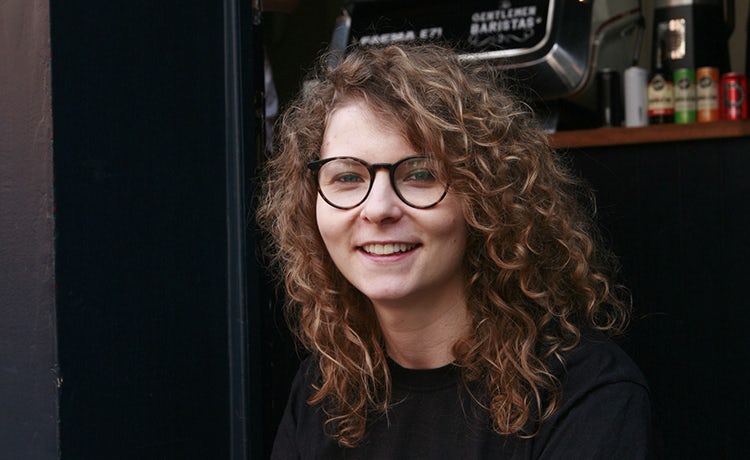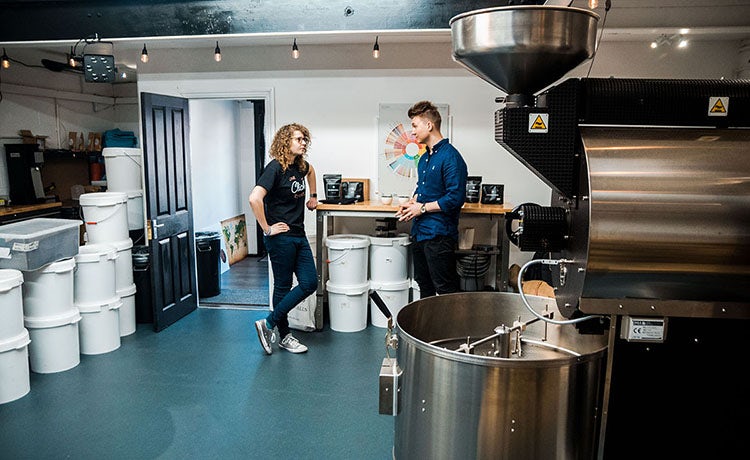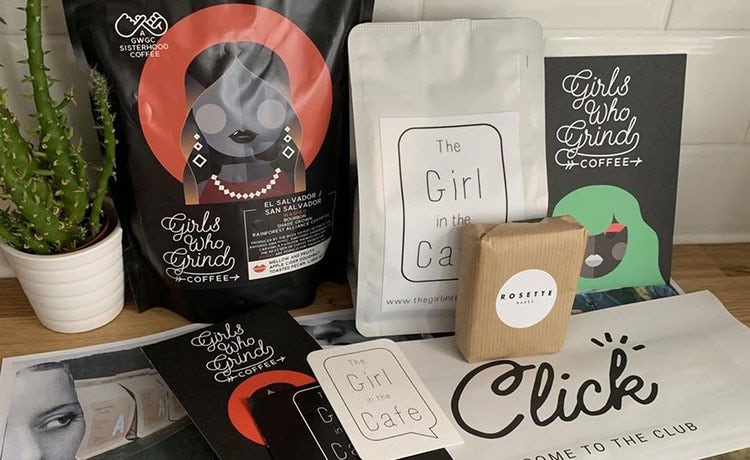Why one marketer swapped global FMCG brands for a coffee startup
Former Mondelēz digital and social media manager, Pollyanna Ward, traded in big budgets and global campaigns to establish her own coffee subscription business.

Swapping the security of a global brand for the thrill of taking your own concept to market is a daunting prospect. Once you have a commercially viable idea, which research suggests might actually appeal to you target consumer, the task is to gain cut-through in a competitive market with a brand new product and then get it onto your potential customers’ radars. Easy right?
Last year, marketer turned entrepreneur, Pollyanna Ward, decided to take the skills she had learnt working in digital and social at global FMCG brands and apply it to her own business.
Founded in August, One Click Coffee offers subscribers two 250g bags of coffee from two different roasters, alongside a free gift and a newspaper featuring interviews with coffee companies for £25 a month. The first subscription box was sent out in January, including coffee from roasters, one based in Nottingham and one London, the newspaper and a cafetière.
A passionate coffee lover herself, Ward saw a gap in the market for a subscription service that enabled coffee drinkers to try coffee from different roasters across the UK and Europe, without having to leave their home.
The decision to start One Click Coffee was informed by her experience working at confectionery giant Mondelēz. She joined the company in 2015 as digital and social media manager responsible for all the digital activity across the UK biscuit category, including Oreo and Belvita. Ward handled digital partnerships with brands such as Buzzfeed and Asos, as well as managing agency relationships and working on the development of the online creative.
Two years into the role she was approached by a former Mondelēz contact via LinkedIn about a role at Dutch dairy company Friesland Campina, a European position that felt like a natural progression. Hired as global social media strategist, Ward was part of an internal test – known as ‘The Milk-ubator’ – which was intended to try out new concepts and products.
Based in Amsterdam during the week, Ward worked on the Vifit Sport brand of gels, protein bars and shakes, selling online direct-to-consumer. She describes the company as having a small business mindset, with the backing and funding of a large FMCG. This approach gave the Vifit Sport team the freedom to try different routes to market, such as linking up with triathlon teams and partnering with the Tour de France and Tour of Britain.
“It was really interesting to go into the sporting world and take my FMCG learnings and apply them to a business where the budgets weren’t as big,” Ward explains.
“It was more about learning the targeting side of things, email campaigns and working with influencers a lot more one-on-one. So, identifying and working with them as brand ambassadors instead from a bigger FMCG perspective where you work with a PR agency and send out loads of products and see what bites. It was more about building relationships.”
When working in a larger, offline focused FMCG business like Mondelēz Ward says she was used to relying on brand uplift and offline sales studies, so she enjoyed being able to track in real time the effect of posting on Facebook or serving a Google ad on consumers.

During this time Ward would buy coffee on her travels across the Netherlands and other parts of Europe, but then discovered she couldn’t order the same coffee once she got back to the UK unless she was a business.
“I thought, I’m learning all the skills now about what an ecommerce website should look like and how many touchpoints the customer has to go through and what sort of information they are looking for, what sort of ad copy I should be testing and how the email marketing works,” she recalls.
“So, I was like let’s just do it. I’ve been here for over a year, do I want to keep flying out, or do I just want to throw myself into it and see what happens?”
READ MORE: Three young marketers on what it will take to get kids interested in marketing careers
Proving the concept
A shift into the coffee market could prove to be a smart move. According to Allegra World Coffee Portal data, the UK coffee shop market grew by 7.9% in 2018 to a market value of £10.1bn, representing 20 consecutive years of sales growth. Allegra predicts that the total UK coffee shop market will exceed £13bn by 2022.
Convinced she had found a gap in the coffee market, Ward registered the name One Click Coffee with Companies House in August 2018 and kicked off a piece of market research with 250 respondents to work out how her potential subscribers consume their coffee.
The research found that mainstream coffee lovers do not go online to buy coffee and the majority had never heard of half of the subscription boxes on the market.
“The main thing for me from the research was that, from a consumer perspective, I don’t really have that much competition. The competition is really when you go into that niche coffee space where you have professional coffee drinkers who have three different brewing kits at home and their favourite brands,” Ward explains.
“For me it was more about cracking the broader audience of people who enjoy coffee, want that experience and would be happy to be educated about it.”

She claimed the website domain name, Instagram handle and Facebook page, and started out following people in the coffee industry. On Instagram Ward tracked down people who had commented on different posts from speciality coffee site Caffeine and messaged to tell them about the concept.
It took her just three days to find 50 influencers up for trying the subscription box. The influencer activity helped quadruple One Click Coffee’s subscriber numbers by the three month mark.
“In big companies it seems like it’s quite tricky [working with influencers],” Ward states. “The issue of influencer fraud was one of the reasons at Friesland Campina we were against agencies picking out influencers, because they just used algorithms, AI and tech, but then you’d never quite get the results you want and it is quite tricky to report on. Whereas I was doing it all myself.”
Since working with this first wave of influencers, Ward has identified some key brand ambassadors who are passionate about the product and have an engaged following, with whom she hopes to build one-on-one relationships.
Content is king
Content is also firmly at the heart of Ward’s strategy for One Click Coffee. During her research period she tried out subscription boxes from different industries and admired the magazine craft beer specialist Beer 52 sent out to its subscribers.
Her idea was to create a 20-page newspaper to include in every box, featuring exclusive interviews with each month’s roasters and people across the coffee scene.
“It’s not that heavily branded. It’s called Click and at the back it does say it has a subscription box, but all the content inside is about the roasters and the stories,” Ward explains.
She believes the newspaper will be a key lead magnet for new subscribers going forward as it continues to grow its distribution. The newspaper alone is now available in more than 50 cafes across the UK.
While the content is focused on the stories behind the roasteries, Ward ensures that any decisions taken on product development or subscription levels are informed by the subscribers. Later this year, for example, she plans to offer special espresso and decaf boxes, based on feedback from a private Facebook group made up of subscribers and roasters.

One Click Coffee originally launched in January with three subscription tiers – three months, six months and a year. However, subscriber feedback suggested people were happier to pay £25 a month for a rolling subscription, rather than laying out £250 in one go for a 12-month sub. So far, the startup has a 100% retention rate.
Other products include an office box priced at £55 a month, intended to share with colleagues and clients, as well as a £40 housemate box which comes with enough coffee for four to five people. In April, One Click Coffee will launch an entry level £5 subscription featuring the newspaper and a sample 80g-100g bag of coffee from a different roaster each month.
While she is firmly focused on growing the One Click Coffee brand, Ward is balancing her startup coffee subscription business with working as a consultant for juice brand Capri Sun. She travels to the company’s Zurich headquarters once a month and advises on the social strategy, workshops and training, as well as consulting on the content calendar, creative and media plans.
“I think it’s good to keep that perspective and work with different people from big business and creative agencies to PR agencies and brand teams, because otherwise I get sucked into a small business bubble and I might not have the same creativity,” Ward explains.
“If I wasn’t doing Capri Sun I’d be doing something else, because I think it’s really important to have as many sources of inspiration and work on different things at once.”







